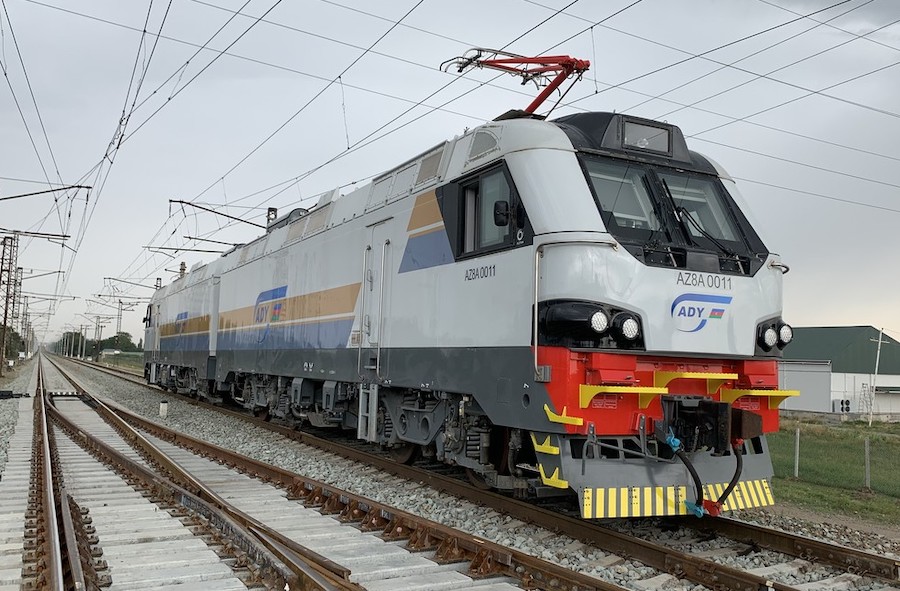Modernization of the railway fleet of Azerbaijan took another major step last year as the country received 9 units of Prima T8 AZ8A freight locomotives manufactured by transportation engineering company Alstom.
According to government data, in 2020, Azerbaijan received freight locomotives assembled in Kazakhstan, worth about $60.7 million. The year before, the country received 17 units of Alstom’s freight locomotives totaling about $101.49 million.
The deal between Alstom and Azerbaijan Railways was inked in 2014 during a visit to Baku by former French President Francois Hollande. Under the deal, worth €288 million, Alstom should have manufactured and delivered 10 Prima M4 AZ4A passenger and 40 Prima T8 AZ8A freight cars. All passenger locomotives were assembled at the Alstom’s plant in France and have already been delivered to Azerbaijan. Freight locomotives are being assembled at the company’s plant in Kazakhstan’s capital city of Nur-Sultan. The delivery of the remaining cars are expected to be made by the end 2021.
In addition, under the agreement Alstom’s specialists are providing technical support and maintenance services in two services depots located in Azerbaijan’s capital city of Baku and Ganja, the country’s second-largest city. They also train Azerbaijani Railways personnel on how to operate the locomotives.
Azerbaijan Railways will operate all Prima AZ8A freight locomotives along Azerbaijan’s segment of the Baku-Tbilisi-Kars railway.
The Prima AZ4A passenger locomotive is capable of running at 160 kilometers per hour (100 miles per hour), and with features that allow it to run in an energy saving mode, the locomotive is considered one of the most versatile in the world. The cars have an automatic train operations system that use global positioning systems, or GPS, to help control operations, run diagnostics, and assist with traffic safety.
The Prima AZ8A heavy freight locomotive is considered one of the most powerful electric locomotives in the world and is capable of running at 120 kilometers per hour (74.5 miles per hour). Technology features allow it to run in an energy-saving mode, making the car energy efficient and environmentally friendly, as it operates via long-distance routes and hauls up to 9,000 tons of cargo. The model was designed and assembled to operate in temperatures ranging from -25°C to 50°C, and requires minimum maintenance, providing high-reliability and a low lifecycle cost.
Alstom, which is ranked amongst the world’s leading brands in integrated transportation systems, recorded sales of €8.2 billion ($9.9 billion) and booked €9.9 billion ($11.95 billion) worth of orders in the 2019-20 fiscal year. Headquartered in France, Alstom has a presence in more than 60 countries and employs 75,000 people.
Alstom has been part of the industrial history of Azerbaijan since 2008. Along with locomotives for Azerbaijan Railways, Alstom has supplied 3 metro train sets to Baku Metro, manufactured jointly with the Russian transportation company Metrovagonmash.
Established in 1878, the railway system in Azerbaijan is the busiest and largest in the South Caucasus region measuring over 2,900 kilometers.
The government in Baku spares no effort to upgrade both the fleet and technical capabilities of the national railway. Currently, 60 percent of the overall 2,910-kilometer railway grid is electrified. The obsolete Soviet-era cars are replaced with cutting-edge coaches purchased from leading global manufacturers, Alstom and Stadler.
In 2017, Azerbaijan launched the 846 km-long (526 miles) Baku-Tbilisi-Kars (BTK) railway considered the most pivotal link in the modern railway grid of Azerbaijan. The newly opened BTK railway is expected to shrink transit time for the shipment of goods coming from Far East, such as China, to Europe by almost half.







 The Mine Action Agency of Azerbaijan (ANAMA) reported on Thursday the discovery of a significant amount of explosives in the Khojavand district of ...
The Mine Action Agency of Azerbaijan (ANAMA) reported on Thursday the discovery of a significant amount of explosives in the Khojavand district of ...
 Iran has refuted reports of alleged damage to Shimon Peres Negev Nuclear Research Centre located southeast of Dimona, Israel, during the recent air...
Iran has refuted reports of alleged damage to Shimon Peres Negev Nuclear Research Centre located southeast of Dimona, Israel, during the recent air...
 Iran’s Foreign Minister, Hossein Amir-Abdollahian, has labeled a foiled Israeli drone attack in certain parts of the country as a "failure" for Isr...
Iran’s Foreign Minister, Hossein Amir-Abdollahian, has labeled a foiled Israeli drone attack in certain parts of the country as a "failure" for Isr...



